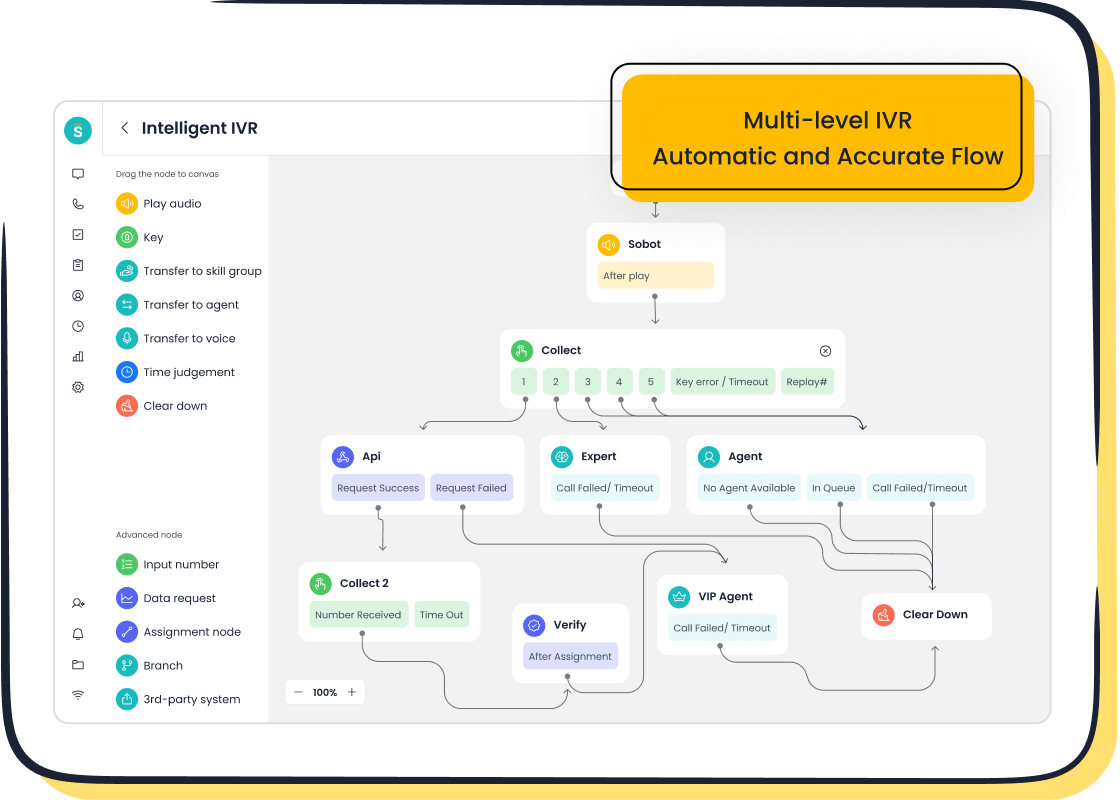Top Customer Service Skills to Enhance Your Workplace Performance

Customer service skills are essential for thriving in your professional journey. They don’t just help you succeed; they make a real difference in how customers perceive your company. Did you know that 80% of employees feel more engaged when they deliver exceptional service? Plus, 73% of workplace success depends on effective communication. These numbers show how mastering key customer service skills can transform your career.

When you bring passion to customer interactions, it doesn’t go unnoticed. Customers appreciate genuine care, and that builds loyalty. Tools like Sobot’s Voice/Call Center make it easier to connect with customers, offering features that streamline communication and enhance productivity. Whether you're resolving issues or creating memorable experiences, these skills and tools work hand in hand to elevate your performance.
Why Key Customer Service Skills Are Crucial
The Role of Customer Service in Professional Growth
Customer service plays a huge role in shaping your career. When you master strong customer service skills like empathy, listening, and communication, you stand out in any workplace. These skills help you connect with customers on a personal level, making them feel valued. For example, a study by Shep Hyken revealed that 81% of consumers prefer personalized experiences. This shows how your ability to tailor interactions can boost your professional reputation.
Think about it—when you solve problems effectively and leave customers happy, you’re not just helping them. You’re building your own confidence and expertise. Over time, this leads to promotions, better opportunities, and recognition in your field. Companies like Samsung have seen their teams thrive by focusing on high-quality customer service, achieving a 97% customer satisfaction rate with tools like Sobot’s omnichannel solutions.
How Customer Service Skills Drive Business Success
Your customer service skills don’t just benefit you—they drive business growth too. When you provide a positive customer experience, you encourage loyalty and retention. Happy customers are more likely to return and recommend your business to others. This word-of-mouth marketing is priceless. Research shows that businesses focusing on customer experience see increased customer loyalty and revenue growth.
For instance, Sobot’s Voice/Call Center helps businesses streamline communication and improve customer interactions. Features like AI-powered voicebots and smart call routing ensure faster resolutions, enhancing customer satisfaction. By using tools like these, companies can align with customer needs, foster loyalty, and gain a competitive edge.
The Link Between Workplace Performance and Customer Satisfaction
Your performance at work directly impacts customer satisfaction. When you’re productive and engaged, customers notice. Data shows that organizations with data-driven performance management see a 30% increase in productivity and a 25% improvement in customer satisfaction scores. These numbers highlight how your efforts can create a ripple effect, benefiting both your team and your customers.

Using tools like Sobot’s unified workspace, you can manage tasks efficiently and focus on delivering exceptional service. This not only improves your performance but also ensures customers leave with a smile. After all, satisfied customers are the foundation of any successful business.
Communication: The Foundation of Customer Service

Active Listening for Understanding Customer Needs
Active listening is one of the most important customer service skills you can develop. It’s not just about hearing words; it’s about truly understanding what your customers need. When you actively listen, you show empathy and build trust, which leads to better relationships. For example, studies show that active listening improves customer retention and boosts satisfaction levels. It also enhances brand loyalty and creates memorable customer experiences.
How can you practice active listening? Start by giving verbal and nonverbal signs of engagement, like nodding or saying “I understand.” Ask thoughtful questions to clarify concerns and demonstrate empathy. This approach helps you gain deeper insights into customer needs, allowing you to adapt your services effectively. Businesses that prioritize active listening often see improvements in KPIs like CSAT ratings and NPS scores.
Sobot’s Voice/Call Center makes active listening easier by providing tools like call tracking and AI-powered voicebots. These features help you focus on customer conversations without distractions, ensuring you capture every detail.
Clear Verbal and Written Communication
Clear communication is the backbone of effective customer service. Whether you’re speaking or writing, your ability to convey information clearly can make or break a customer interaction. Customers appreciate straightforward answers and concise explanations. This skill is essential for resolving issues, building rapport, and addressing objections.
To improve your communication, focus on using simple language and empathetic techniques. For example, when responding to a customer email, avoid jargon and stick to clear, actionable steps. In verbal interactions, maintain a friendly tone and ensure your message is easy to understand.
Sobot’s unified workspace supports clear communication by consolidating customer data and messages into one platform. This makes it easier for agents to respond quickly and accurately, enhancing the overall customer experience.
Non-Verbal Communication and Tone of Voice
Did you know that non-verbal cues account for over 90% of communication? Research shows that tone of voice influences 38% of customer perceptions, while body language and facial expressions make up 55%. These elements play a huge role in how customers feel during interactions.
For instance, a warm and friendly tone can instantly put customers at ease, while a rushed or impatient tone might create frustration. Similarly, maintaining open body language, like leaning slightly forward, signals attentiveness and empathy.

Sobot’s Voice/Call Center helps you manage tone and non-verbal communication effectively. Features like call recording and monitoring allow you to review interactions and refine your approach. By focusing on these subtle yet impactful elements, you can create a positive impression and build lasting customer relationships.
| Communication Type | Influence Percentage |
|---|---|
| Verbal Language | 7% |
| Tone of Voice | 38% |
| Body Language/Facial Expressions | 55% |
Emotional Intelligence: The Power of Empathy

Why Empathy Is an Essential Customer Service Skill
Empathy is the heart of great customer service. When you show empathy and understanding, you make customers feel valued and heard. This emotional connection builds trust and loyalty, which are essential for long-term relationships. For example, studies by Freshworks reveal that empathy triggers emotional bonds, influencing customer decisions and loyalty. Similarly, Call Center Studio highlights how validating customer concerns through empathy can diffuse tense situations and prevent escalation.
Empathy humanizes your interactions. It’s not just about solving problems; it’s about making customers feel like they matter. When you project warmth and actively listen, you create memorable experiences that customers won’t forget. In fact, a good customer experience can improve business outcomes by up to 40%. Tools like Sobot’s Voice/Call Center help you focus on empathetic communication by providing features like call tracking and AI-powered voicebots, ensuring every interaction feels personal and meaningful.
| Benefit | Impact on Customer Service |
|---|---|
| Customer Satisfaction | Increased due to feeling valued and heard |
| Customer Retention | Higher retention rates |
| Complaints and Conflicts | Reduced occurrences |
| Brand Reputation and Loyalty | Enhanced through positive experiences |
| Staff Morale and Performance | Improved due to better team dynamics |
| Memorable Customer Experiences | Created through empathetic interactions |
Managing Emotions in High-Stress Situations
High-stress situations can test your composure and resilience. Staying calm and empathetic is key to managing these moments effectively. Anticipating customer emotions helps you design services that reduce negative feelings. For example, tailoring offerings for high-emotion services like weddings or medical emergencies can address strong feelings before they arise.

When emotions run high, projecting warmth can diffuse tension. A friendly tone and calm demeanor reassure customers, showing them you’re there to help. Sobot’s Voice/Call Center supports this by offering call monitoring and analysis tools, helping you refine your approach during challenging interactions. These features ensure you stay composed and deliver solutions that leave customers satisfied.
| Emotional Dynamics | Effective Strategies |
|---|---|
| Anticipating customer emotions | Design services to mitigate negative feelings |
| High-emotion services | Tailor offerings to address strong feelings |
Building Trust and Positive Relationships with Customers
Trust is the foundation of customer loyalty. When customers trust your brand, they’re more likely to return and recommend your services. In fact, 58% of U.S. customers consider a company’s reputation a top factor when making purchases. Trust also reduces churn, encouraging customers to stick with brands they believe in.
Building trust starts with empathy and consistent service. When you validate concerns and provide solutions, you show customers they can rely on you. Sobot’s unified workspace helps you deliver seamless service by consolidating customer data, ensuring every interaction feels personalized. Trustworthy businesses benefit from positive word-of-mouth, which drives repeat business and long-term relationships.
- Trust enhances customer loyalty and retention, resulting in repeat business.
- Customers who trust a brand are more likely to act as advocates, generating positive word-of-mouth referrals.
- Trust minimizes perceived risk, leading to long-term customer relationships.
Problem-Solving and Adaptability in Customer Service
Identifying and Resolving Customer Issues Effectively
When it comes to customer service, identifying and resolving issues quickly is a game-changer. Customers expect you to understand their concerns without making them repeat themselves. This is where tools like customer identity resolution (CIR) shine. By consolidating interactions across channels, CIR creates a unified profile for each customer. For example, a travel company can use this to recognize past bookings and preferences, offering a seamless experience.
Imagine a customer named Jane who shops at a shoe brand. She browses anonymously but later logs in to make a purchase. By linking her actions, the brand gains insights into her preferences, enabling personalized recommendations. This approach not only resolves issues faster but also enhances the overall customer experience.
Metrics like First Contact Resolution (FCR) and Customer Effort Score (CES) highlight the importance of problem-solving. High FCR rates show efficiency, while lower CES scores indicate a smoother experience. Quick response and resolution times further boost customer satisfaction, as shown below:
| Evidence Type | Description |
|---|---|
| First Contact Resolution (FCR) | High FCR rates indicate efficient problem-solving in customer service. |
| Customer Effort Score (CES) | Lower effort scores signify a positive customer experience, highlighting adaptability. |
| Response Times | Quick response times lead to improved customer satisfaction, emphasizing the need for adaptability. |
| Resolution Times | Efficient resolution times contribute to overall customer satisfaction, reinforcing the importance of problem-solving. |
Creative Thinking for Unique Solutions
Sometimes, solving customer problems requires thinking outside the box. Creative thinking helps you find unique solutions that leave a lasting impression. Take the example of a boutique fitness studio. Faced with declining memberships, they used design thinking to revamp their customer experience. This approach not only boosted engagement but also rejuvenated their market position.
Another inspiring case is Vogmask & Rush Order. They scaled their order processing by 900% while maintaining a 92% customer satisfaction rate. This success came from innovative strategies and effective partnerships. Whether you're in retail, healthcare, or e-commerce, creative problem-solving can transform challenges into opportunities.

Sobot’s Voice/Call Center supports this by offering features like AI-powered voicebots and smart call routing. These tools empower you to think creatively and deliver tailored solutions, ensuring every customer feels valued.
Adapting to Diverse Customer Personalities and Scenarios
Every customer is unique, and adapting to their personalities is key to providing excellent service. Analytical customers prefer detailed information, while social customers value experiences and validation. Tailoring your approach to these traits creates personalized interactions that boost satisfaction.
For instance, when dealing with an analytical customer, focus on facts and data. On the other hand, a social customer might appreciate a friendly tone and engaging conversation. Research shows that understanding customer personalities leads to higher satisfaction rates and better sales effectiveness.
Sobot’s omnichannel solutions make this easier by consolidating customer data into a unified workspace. This allows you to adapt your strategies seamlessly, ensuring every interaction feels personal and meaningful. By embracing adaptability, you can turn diverse scenarios into opportunities for building trust and loyalty.
Technical Expertise and Product Knowledge
Mastering Tools Like Sobot's Voice/Call Center
Mastering the right tools can transform how you deliver customer service. Imagine having a platform that simplifies your workflow, boosts efficiency, and improves customer satisfaction. That’s exactly what Sobot’s Voice/Call Center offers. With features like real-time analytics, AI-powered voicebots, and smart call routing, you can handle inquiries faster and more effectively. These tools don’t just make your job easier—they elevate the entire customer experience.
Let’s look at the numbers. Businesses using tools like Sobot’s Voice/Call Center report significant benefits:
| Performance Metric | Benefit Description |
|---|---|
| Real-Time Analytics and Reporting | Provides insights into call volumes, agent performance, and customer satisfaction. |
| Customer Experience Improvement | Leads to higher customer satisfaction and loyalty through faster response times. |
| Increased Efficiency | Streamlines operations, allowing agents to handle more inquiries effectively. |
| Cost Savings | Reduces operational costs through automation and optimized resource allocation. |
| Scalability | Adapts to changing business needs, accommodating increased call volume. |
By mastering tools like these, you’ll not only enhance your customer service skills but also contribute to your company’s success.
Staying Updated on Product Features and Services
Keeping up with product updates is essential for delivering reliable customer service. When you know your products inside and out, you can answer questions confidently and resolve issues quickly. This builds trust and ensures customers feel valued.
Staying informed also has measurable benefits:
- High customer satisfaction scores (CSAT) show that customers appreciate knowledgeable support.
- Delighted customers are less likely to churn, leading to higher retention rates.
- According to Gartner, customers who receive high-quality service are 82% more likely to stay loyal to a company.
Sobot makes it easy to stay updated. Its unified workspace consolidates customer data and product information, so you always have the latest details at your fingertips. This ensures every interaction feels seamless and professional.
Leveraging Technology to Enhance Customer Experience
Technology is a game-changer in customer service. It helps you deliver faster, more personalized support, which customers love. Studies show that integrating technology into the customer journey can improve loyalty and differentiate businesses in competitive markets.
For example, Sobot’s omnichannel solutions allow you to manage interactions across platforms like email, chat, and voice—all from one place. This creates a smooth experience for customers, no matter how they reach out. Plus, features like AI-driven automation handle repetitive tasks, freeing you to focus on complex issues.
When you embrace technology, you’re not just keeping up—you’re setting a new standard for customer service excellence.
How to Develop and Improve Essential Customer Service Skills
Training Programs and Professional Development
Investing in training programs is one of the best ways to sharpen your customer service skills. These programs don’t just teach you the basics—they help you master advanced techniques like handling difficult customers, improving response times, and delivering personalized experiences. Research shows that 85% of decision-makers believe employee experience directly impacts customer experience. This means that when you feel confident and well-trained, your customers benefit too.
| Statistic | Insight |
|---|---|
| 85% of decision-makers agree that there is a direct link between employee experience and customer experience. | This indicates that improving employee satisfaction through training can enhance customer service. |
| 53% of consumers have hired a business that was the quickest to respond. | This shows that timely responses, which can be improved through training, are valued by customers. |

Companies like Samsung have seen measurable improvements in customer satisfaction after implementing training programs. Employees reported better communication skills and a deeper understanding of customer needs, which translated into higher satisfaction rates. Tools like Sobot’s Voice/Call Center can complement these efforts by providing real-time analytics and call monitoring, helping you track your progress and refine your approach.
Seeking Feedback and Continuous Learning
Feedback is a goldmine for growth. Asking for feedback from customers and colleagues helps you identify areas for improvement and build on your strengths. It also fosters open communication within teams, creating a culture of continuous learning. For example, feedback can reveal whether your tone of voice resonates with customers or if your problem-solving approach needs tweaking.
Continuous learning keeps you ahead of the curve. Staying updated on industry trends and customer expectations enhances your ability to adapt and deliver exceptional service. Studies show that well-educated customer service teams improve retention rates and solve problems more effectively. Sobot’s unified workspace makes it easy to track customer interactions and gather insights, ensuring you’re always learning and improving.
- Feedback promotes open dialogue within teams, encouraging real-time learning.
- Constructive feedback enhances customer satisfaction and builds trust.
- Continuous learning improves problem-solving abilities and boosts retention rates.
Practicing Skills in Real-World Scenarios
Practice makes perfect, especially in customer service. Role-playing exercises and situational judgment tests are excellent ways to prepare for real-world challenges. These methods let you practice handling different customer personalities, from the analytical to the emotional, in a controlled environment. Trainers can provide real-time feedback, helping you refine your skills and gain confidence.
| Aspect | Description |
|---|---|
| Skills Developed | Communication, empathy, and problem-solving are crucial for effective customer interactions. |
| Real-World Scenarios | Trainees practice responses to various customer needs, enhancing their confidence in handling issues. |
| Role-Playing Exercises | Provides hands-on experience in a controlled environment, making training more effective. |
| Real-Time Feedback | Trainers offer specific guidance, helping trainees learn quickly and feel prepared for real situations. |
Empathy is especially important in these scenarios. Unlike AI systems, human representatives can listen and respond with understanding, creating meaningful connections with customers. Sobot’s omnichannel solutions allow you to apply these skills seamlessly across platforms, ensuring every interaction feels personal and professional.
Developing strong customer service skills is your gateway to career growth and workplace success. When you master communication, empathy, problem-solving, and technical expertise, you’re not just improving yourself—you’re creating better experiences for your customers. According to Gartner, proactive customer service can resolve issues by 30%, showing how impactful these skills can be.
Tools like Sobot’s Voice/Call Center make this journey easier. With features like AI-powered voicebots and real-time analytics, you can deliver faster, more personalized support. Satisfied customers often become loyal advocates, driving growth and profitability for your business. Take the first step today—refine your skills, embrace innovation, and unlock new opportunities in your career.
FAQ
What are the most important customer service skills to develop?
The key skills include communication, empathy, problem-solving, and adaptability. These skills help you connect with customers, resolve issues effectively, and build trust. Tools like Sobot’s Voice/Call Center enhance these abilities by streamlining communication and providing real-time insights for better service.
How can Sobot’s Voice/Call Center improve my customer service performance?
Sobot’s Voice/Call Center offers features like AI-powered voicebots, smart call routing, and real-time analytics. These tools help you handle inquiries faster, reduce response times, and deliver personalized support. By mastering these tools, you can elevate your customer service skills and boost customer satisfaction.
Why is empathy crucial in customer service?
Empathy helps you understand and address customer emotions, making them feel valued. It builds trust and loyalty, which are essential for long-term relationships. For example, using Sobot’s call tracking feature, you can focus on empathetic communication and create meaningful connections with customers.
How does technology enhance customer service skills?
Technology simplifies workflows and improves efficiency. For instance, Sobot’s omnichannel solutions let you manage interactions across platforms like email, chat, and voice from one place. This ensures seamless communication, faster resolutions, and a better overall customer experience.
What’s the best way to practice customer service skills?
Role-playing and real-world scenarios are great for practice. Use tools like Sobot’s Voice/Call Center to simulate customer interactions and refine your approach. Feedback from colleagues and customers also helps you identify areas for improvement and grow your skills.
See Also
Enhancing Customer Satisfaction Through Effective Live Chat Strategies
Essential Practices for Effective Call Center Quality Management
The Leading Customer Service Software Options for 2024
Improving Call Center Efficiency Through Effective Monitoring Techniques
Enhancing Operational Efficiency with AI-Driven Customer Service Tools